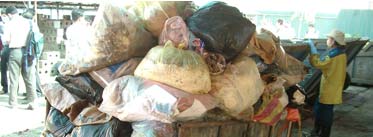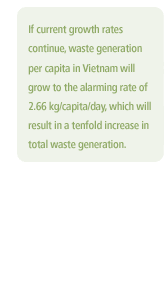



In the summer of 2002, Waste-Econ expanded its activities into Laos and Cambodia. The staggered timing of activities in the three countries is allowing opportunities for our partners in Laos and Cambodia to benefit from the experience of our Vietnamese partners. Lessons learned are passed along through international conferences, meetings and less formal interactions.
Our primary partner in Cambodia is the Royal University of Phnom Penh (RUPP). A full list of Steering Committee members can be found on the Partners and Personnel page.
CAPACITY BUILDING THROUGH TRAINING
As of January 2004, RUPP has conducted their six-week training course in Phnom Penh and one two-week provincial training course in Siem Reap resulting in over 75 professionals from a variety of sectors trained in the theory of the waste economy. The courses presented focused on: urban solid waste management, industrial waste management, research methods (co-taught by one of our Vietnamese partners), economics of waste management, public health and the informal sector's role in the waste economy. Additional two-week training course are proposed for 2004.
EXPANDING RESEARCH CAPACITY THROUGH PILOT PROJECTS
Between January 2004 and August 2004, RUPP will be conducting a feasibility study on the potential for establishing a community-based waste collection system in one of two villages in Siem Reap that have no collection service at the moment. Elements of the feasibility study include: discussions with local government officials, local leaders and the town's private waste management collection agency about the sites to be investigated; a household survey asking residents about their current waste management practices and their willingness to participate in a community-based collection system; and a cost-benefit analysis of the proposed system. If the results from the feasibility study are positive, RUPP will proceed with implementation of the proposed system in one of the villages.
